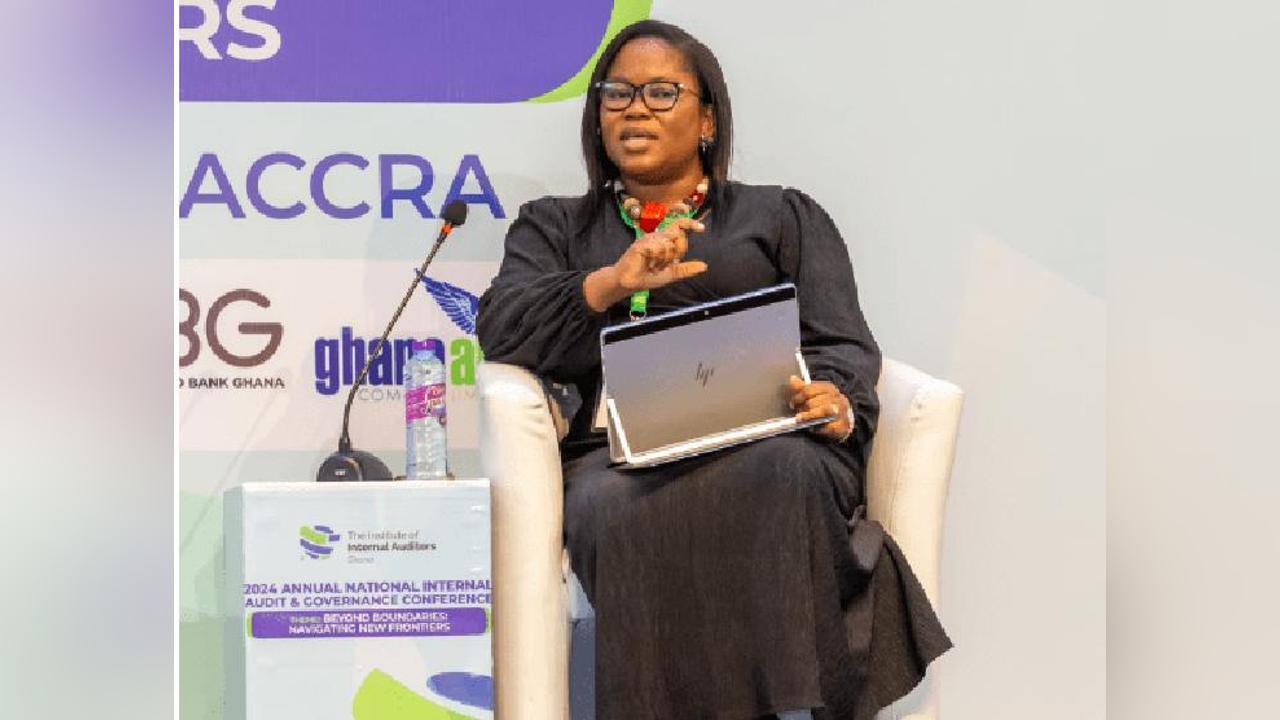Africa-Press – Ghana. Tax and Regulatory Partner at Deloitte Ghana, Gloria Boye-Doku, has pointed out that Diversity, Equity and Inclusion (DEI) are strategic imperatives that attract talents and investments toward the growth of businesses and not only a social imperative of being gender balance, having female representation or creating an inclusive world for all.
According to her, DEI represents fundamental values and principles that aim at creating fair, respectful, and inclusive environments for all individuals no matter their background.
She’s therefore calling for DEI that represents the fundamental values and principles aimed at creating fair, respectful, and inclusive environments for all individuals.
Speaking at the 2024 Annual National Internal Audit and Governance Conference in Accra recently, Mrs. Boye-Doku said great minds and talents are not only looking at investing for profit or getting a paid cheque in the current global economy or space but rather seeking to associate their brands with organizations whose vision and purpose aligns with their values of equity and inclusion.
Her submission was about the Deloitte Global 2022 Gen Z (90’s 2010) & Millennial (1980-90) Survey where 52% of Gen Zs and Millennials were not satisfied with their current organisation’s progress in creating a diverse and inclusive workplace. This meant that companies that want to attract the best talents would need to know how to appeal to the next generation of workers.
Why DEI?
She pointed out that employees deliver to their utmost best when they feel valued empowered and respected by their peers and employers.
“Science has proven that when people feel included and respected their bodies create hormones and healthy energy that raises their performance at work. In fact, Deloitte has done quite extensive research within the space of Diversity Equity and Inclusion for which the results are intriguing”, she stressed.
Deloitte 2015 research on Business Impact of High-performing companies suggested that companies embrace DEI in all aspects of their business, outperformed their peers.
Specifically, throughout the studied, it was found that these companies achieved 2.3 times higher cash flow per employee over three years compared to peers, leading to Improved performance. Again, these companies are 1.7 times more likely to be innovation leaders in their market, while 2.9 times more likely to identify and build leaders.
Future of DEI
For remote work and virtual inclusion, Mrs. Boye Doku said companies will have to deploy systems to ensure team bonding and connection with all staff members no matter their location.
Regarding AI and bias mitigation, she stressed the need for recruitment selection to be based on qualification and no room for stereotyping or feeding in human bias.
Other issues to be looked at are globalization and cultural competence, Data-driven insight and accountability and continued learning and adoption.
Below are some specific strategic reasons why companies must embrace DEI
Implementing DEI
In summary, Gloria Boye-Doku said DEI is the way to go in this changing global economy.
As such, science has proven that when people feel included and respected their bodies create hormones and healthy energy that raise their performance at work.
Pursuing Organizational Value through Diversity equity and inclusion
Good afternoon and thanks for having me!
Diversity, Equity, and Inclusion (DEI) represent fundamental values and principles that aim to create fair, respectful, and inclusive environments for all individuals.
Diversity encompasses the recognition and celebration of differences among people, including but not limited to race, gender, age, ethnicity, sexual orientation, religion, and abilities.
Equity focuses on ensuring equal opportunities, fairness, and justice for everyone, particularly those from historically marginalized or disadvantaged backgrounds.
Inclusion involves creating environments where diverse perspectives are valued, voices are heard, and all individuals feel welcomed, respected, and empowered to contribute their unique talents and experiences. Together, these principles promote a culture of belonging, respect, and collaboration that drives innovation, fosters growth, and strengthens communities
In a globally connect world where investor, great minds and talents are not only looking at investing for profit or getting a paid check at month but rather looking out to associate with organizations whose vision and purpose aligns with their personal values of equity and inclusion, DEI comes in handy.
According to a Deloitte Global 2022 Gen Z (90’s 2010)& Millennial (1980-90)Survey, 52% of Gen Zs and Millennials are not satisfied with their current organization’s progress in creating a diverse and inclusive workplace.
Which means that companies who want to attract the best talent in their respective industries will need to know how to appeal to the next generation of workers.
So DEI is not only a social imperative of being gender balance, having female representation or creating and inclusive world for all But also a strategic imperative to attract talents and investment toward the growth of your businesses
DEI – represent fundamental values and principles that aim to create fair, respectful, and inclusive environments for all individuals no matter the background.
I am excited about the topic and looking forward to engaging with all of you during the Q&A session.
Why DEI
People work best when they feel valued empowered and respected by their peers and employers.
Science has proven that when people feel included and respected their bodies create hormones and healthy energy that raises their performance at work.
In fact Deloitte has done quite an extensive research within the space of Diversity Equity and Inclusion for which the results are intriguing.
Deloitte 2015 research on Business Impact of High Performing companies
suggest that companies that embrace DEI in all aspects of their business, outperform their peers.
Specifically, over the period of the studied, it was found out that these companies achieved:
2.3 times higher cash flow per employee over a three-year period compared to mkt peers leading to Improved bus performance. Again these companies…..are
1.7 times more likely to be innovation leaders in their market
2.9 times more likely to identify and build leaders – Leadership Effectiveness.
3.8 times more likely to be able to coach people for improved performance, leading to talent Acquisition and Retention
Below are some specific strategic reasons why companies must embrace DEI.
These areas highlight the multifaceted value that diversity, equity, and inclusion bring to corporate organizations, ranging from improved business performance and talent acquisition to enhanced brand reputation and social responsibility. By prioritizing DEI initiatives, companies can create a more inclusive and equitable workplace culture that benefits employees, customers, and society as a whole.
How to implement DEI
By focusing on these areas, companies can pursue organizational value through diversity, equity, and inclusion, fostering a culture of belonging, innovation, and success for all employees and stakeholders.
Challenges of implementing DEI
Solution: Foster a culture of openness, transparency, and communication to address resistance to change. Provide education and awareness training on the importance and benefits of DEI, highlighting the business case for diversity and inclusion. Engage stakeholders in dialogue and collaboration to build buy-in and support for DEI initiatives, and address concerns or misconceptions proactively.
Solution: Implement training and education programs to raise awareness of unconscious bias and its impact on decision-making processes. Provide tools and strategies for recognizing and mitigating bias in recruitment, hiring, promotion, and performance evaluation processes. Foster a culture of accountability and zero tolerance for discrimination, and establish clear reporting mechanisms for addressing incidents of bias or discrimination.
Solution: Engage senior leaders and executives as champions and advocates for DEI, emphasizing the strategic importance of diversity and inclusion to the organization’s success. Hold leaders accountable for advancing DEI goals through performance evaluations, incentives, and recognition programs. Establish diversity councils or task forces with cross-functional representation to provide oversight, guidance, and accountability for DEI initiatives.
Solution: Prioritize DEI initiatives and allocate sufficient resources, budget, and staffing to support implementation and sustainability. Leverage internal and external partnerships, networks, and resources to maximize impact and reach. Seek creative funding opportunities, grants, or sponsorships to support specific DEI programs or initiatives. Invest in technology and data analytics to streamline DEI efforts and measure impact effectively.
Solution: Conduct a thorough assessment of organizational systems, policies, and practices to identify and address systemic inequities and barriers to DEI. Engage stakeholders in courageous conversations about privilege, power dynamics, and structural inequalities, and commit to systemic change and reform. Establish diversity task forces or working groups to develop and implement action plans for addressing systemic inequities and promoting inclusivity.
Solution: Create a culture of belonging and inclusion where all employees feel valued, respected, and supported in their careers. Provide opportunities for career development, mentorship, and advancement for employees from diverse backgrounds. Establish affinity groups, employee resource groups, or diversity councils to provide support, networking, and advocacy for underrepresented employees. Conduct regular employee surveys and feedback sessions to assess satisfaction, engagement, and retention among diverse talent and take action to address concerns or gaps proactively.
By addressing these challenges with strategic planning, proactive measures, and a commitment to continuous improvement, organizations can overcome barriers to DEI implementation and create more inclusive, equitable, and thriving workplaces for all employees.
Source: 3News
For More News And Analysis About Ghana Follow Africa-Press







